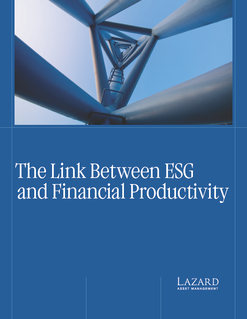Summary
Our research suggests that investors do not have to choose between their return objectives and their values if they focus on “compounders,” or companies that demonstrate the highest level of financial productivity. Many of these companies have strong ESG characteristics and it appears these companies have the potential to deliver superior investment returns over the long term.
In addition to being positively correlated with equity returns, the teams also find a strong relationship between financial productivity and environmental and governance ratings. To demonstrate the link between financial productivity and carbon intensity, the teams grouped the active members of the MSCI AC World Index into deciles of reported financial productivity and then compared this with the average carbon footprint for each financial productivity decile, between 2015 and 2018 (Exhibit 1).
The most financially productive companies (i.e., those that fall within the top decile of financial productivity) have the lowest carbon footprint. The teams also found a similar relationship between firms’ financial productivity and their MSCI governance ranking, as the most financially productive companies typically also have the strongest corporate governance practices (Exhibit 2).
EXHIBIT 1
Financial Productivity and Carbon Intensity Are Closely Linked
As at 25 May 2018
Carbon emissions data as at 31 January 2018. The active members of the MSCI AC World Index have been grouped into deciles of reported financial productivity and then compared with the average carbon footprint for each financial productivity decile between 2015 and 2018.
Source: Lazard, Credit Suisse, Trucost
EXHIBIT 2
Strong Governance May Enhance Financial Performance
As at 25 May 2018
Governance scores as at 31 January 2018. The active members of the MSCI AC World Index have been grouped into deciles of reported financial productivity and then compared with the average MSCI governance score for each financial productivity decile between 2015 and 2018.
Source: Lazard, Credit Suisse, MSCI
